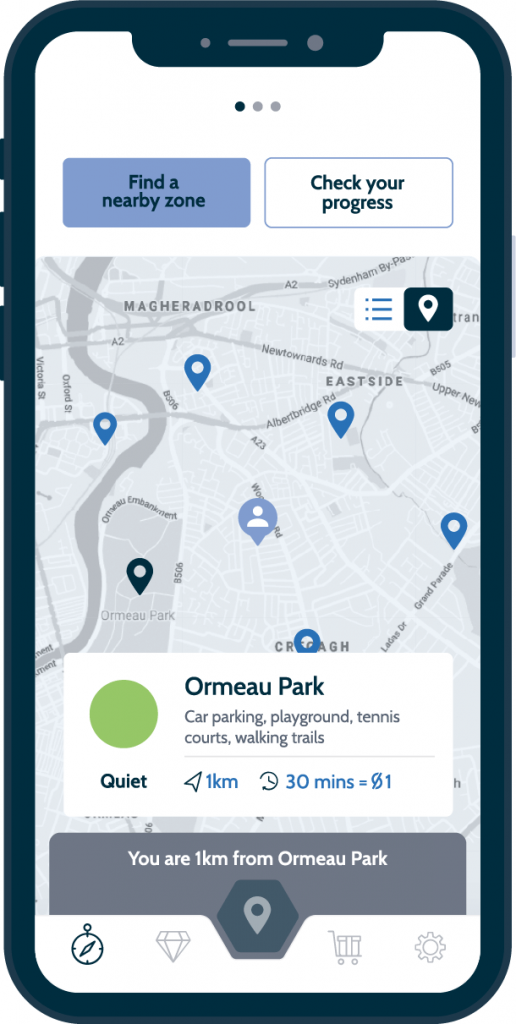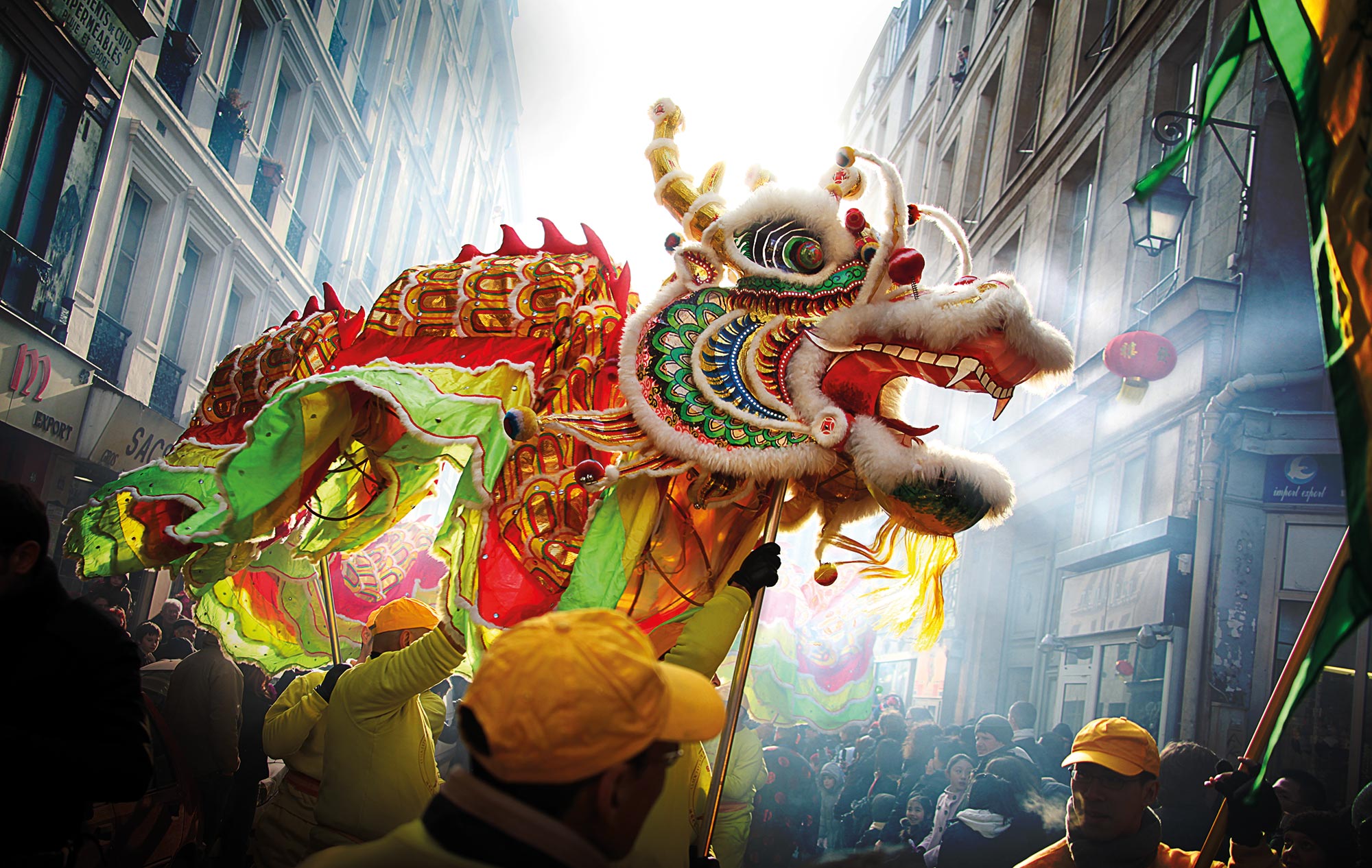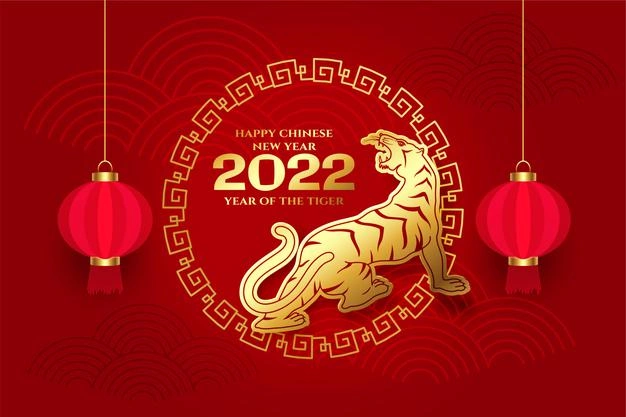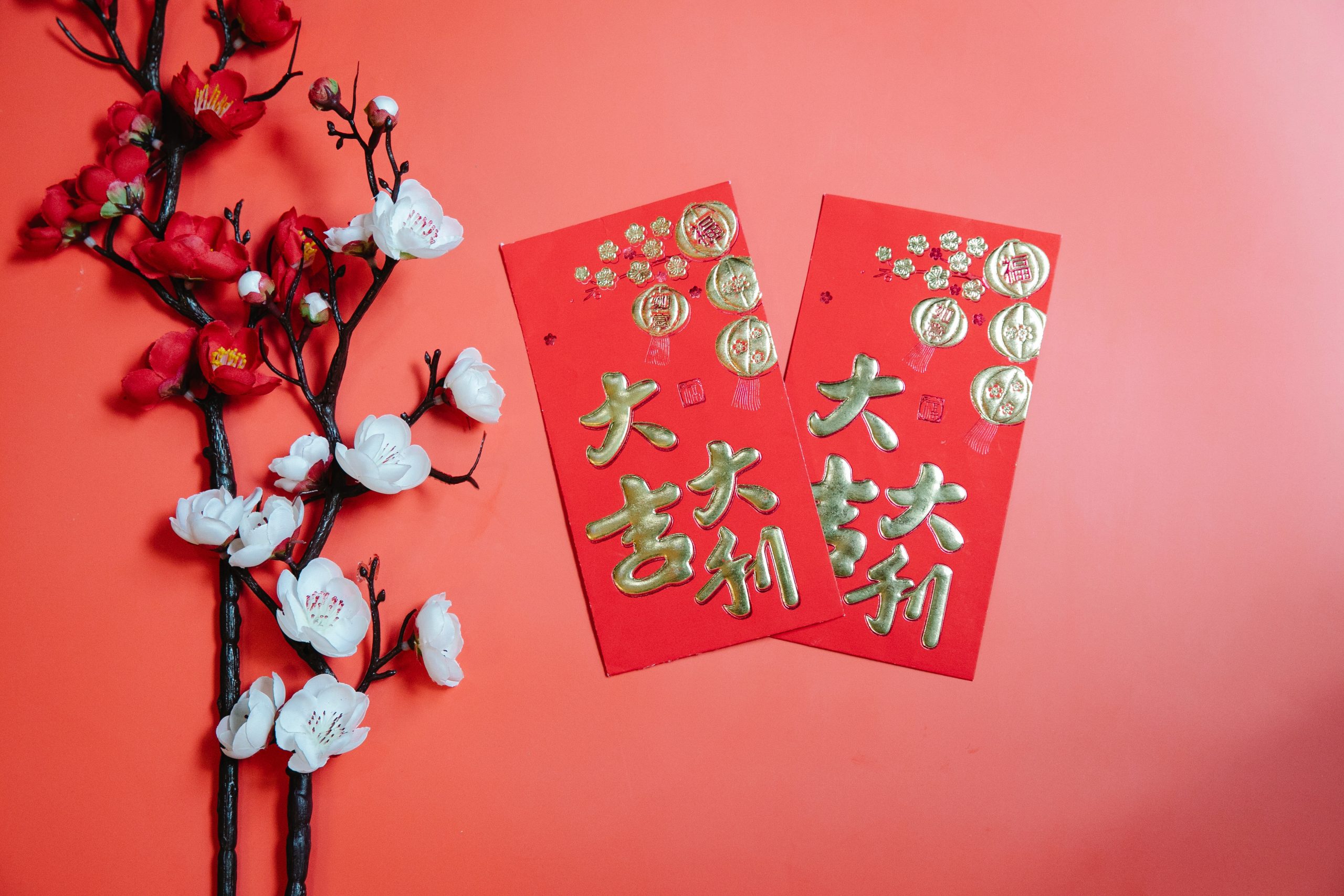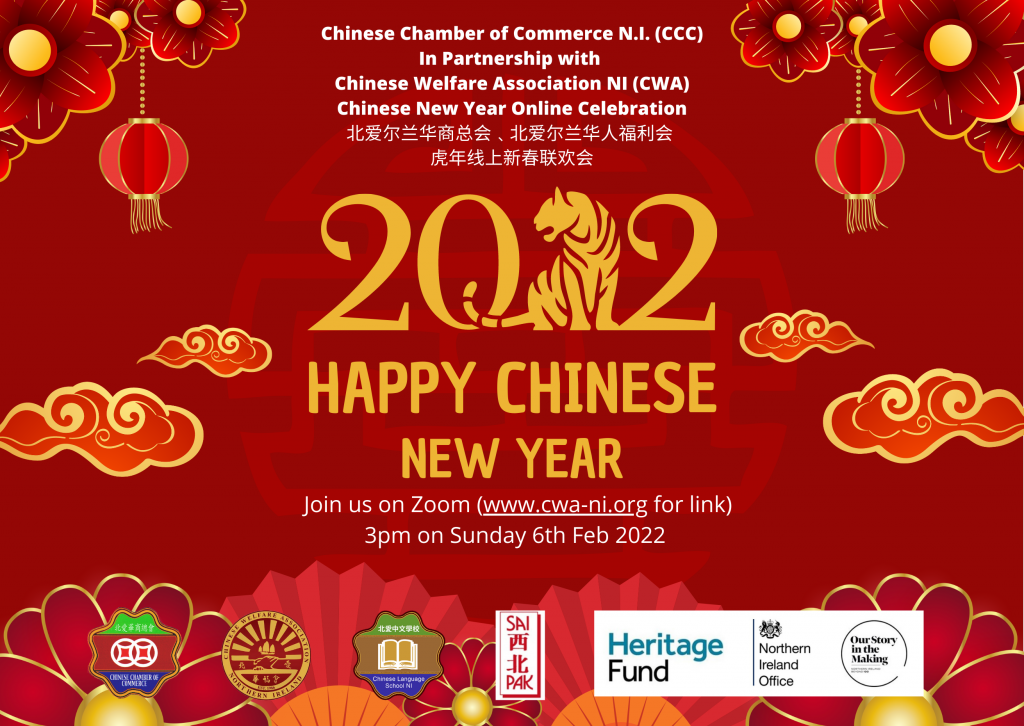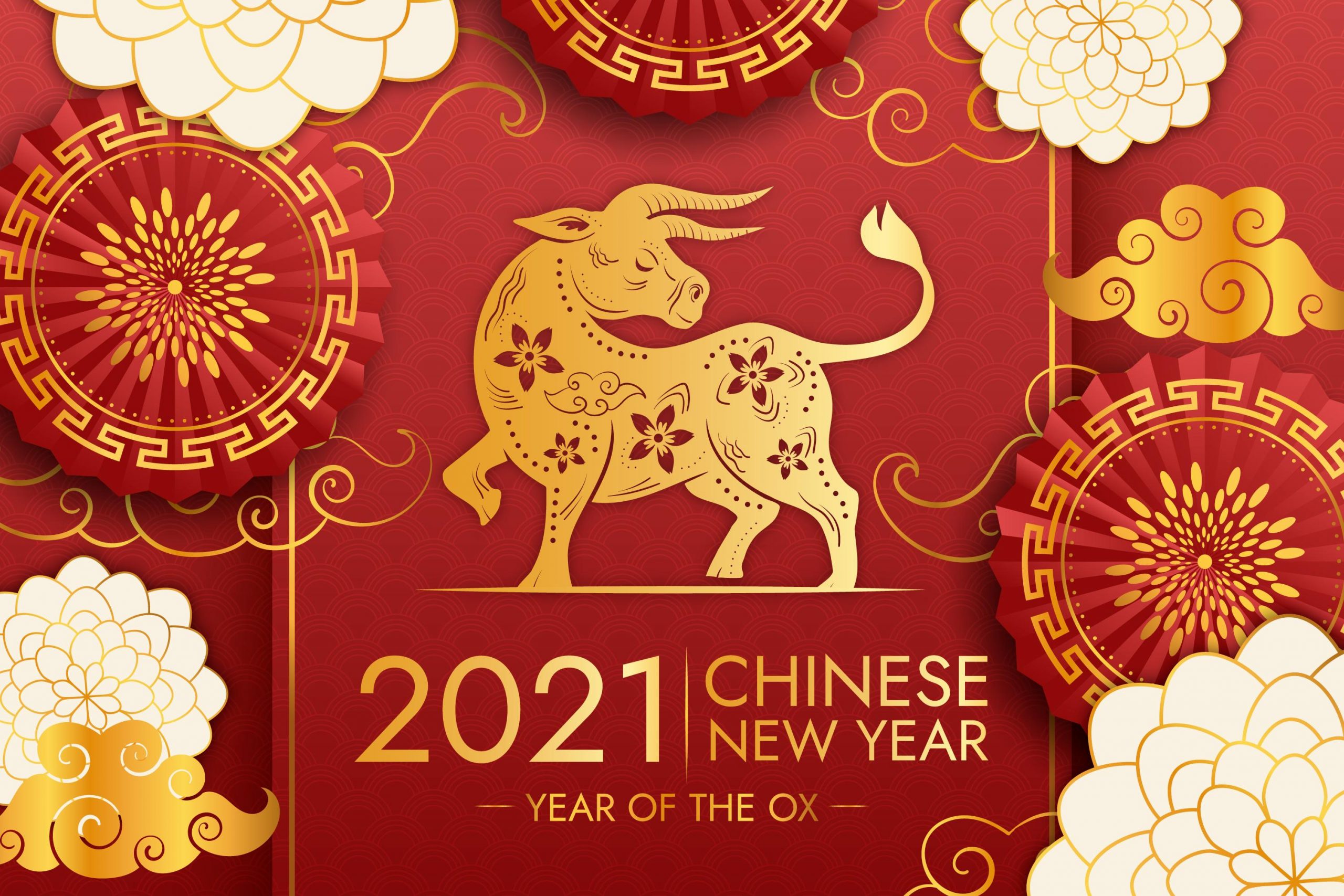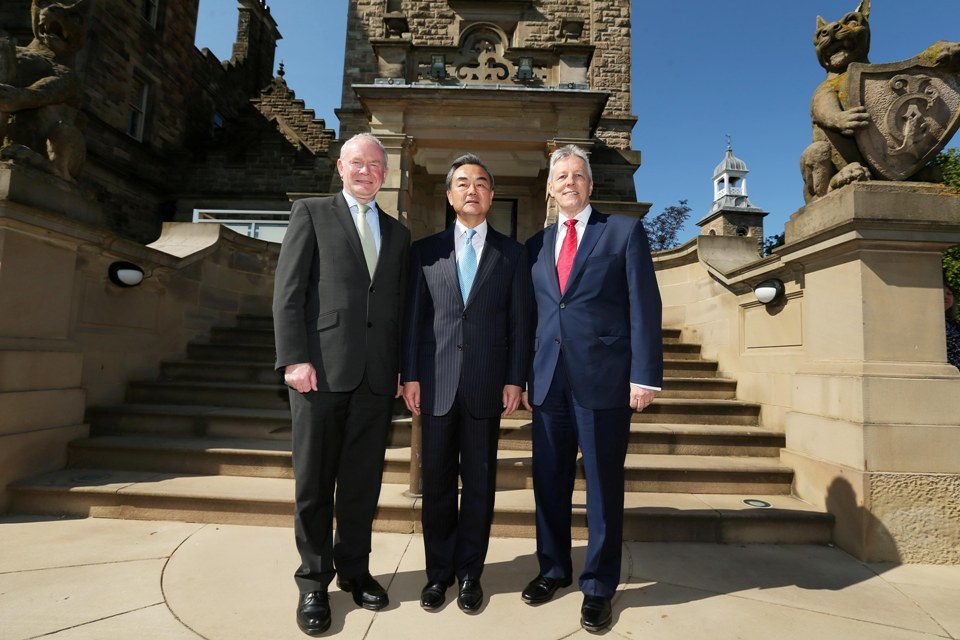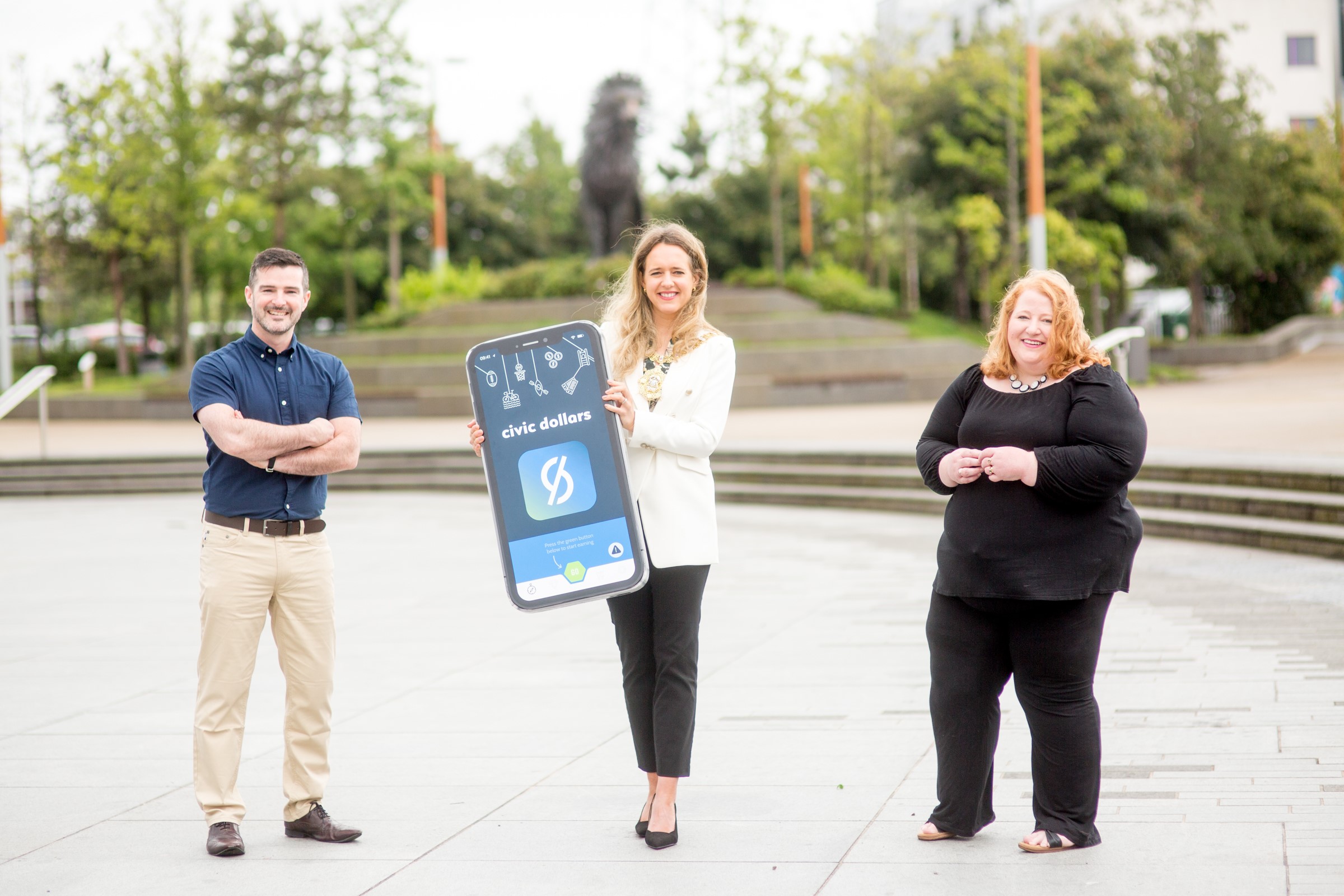We Are Hiring-Managing Director
We are hiring for Managing Director.
March 2025
Job Description
Job title: Managing Director
Location: Chinese Resource Centre, 1 Stranmillis Embankment, Belfast BT7 1GB
Responsible to: CWA Management Committee
Salary: £28,081.00 (with the potential for a salary review)
Hours: 35 hours per week
Contract Type: Fixed Term (ending 31st March 2026), contract may be renewed subject to funding
The Managing Director will be accountable to the Management Committee and will assist
the Committee in implementing the Mission Statement, core aims and objectives of the
Association. The post holder will be responsible for executing the following tasks, using a
range of competences:
Click here for more details.

History of Chinese New Year
All good stories change bit over time, as each teller adds a little or changes something. A story that is over 3,500 years old has been told many times and it has taken on a life of its own.
The story of how the most important holiday in Chinese culture began is no different but many of the best bits have remained unchanged. The centuries-old legend of the origins of the Chinese New Year celebration always includes a story of a terrible mythical monster preying on villagers. The lion-like monster’s name was Nian (年), which is also the Chinese word for “year."
The stories often include a wise old man who counsels the villagers to ward off the evil Nian by making loud noises with drums and firecrackers and by hanging red paper cutouts and scrolls on their doors, because Nian is scared of the color red.So the villagers took the old man’s advice and Nian was conquered. On the anniversary of the date, the Chinese recognize the “passing of the Nian,” known in Chinese as guo nian (过年), which is synonymous with celebrating the new year.
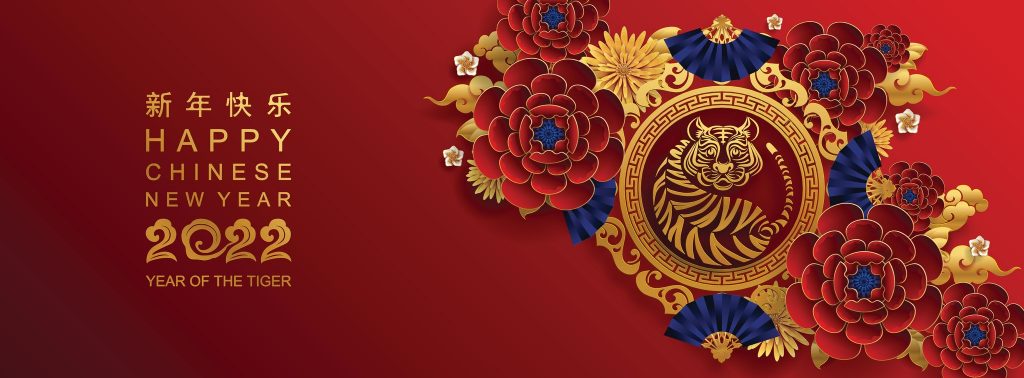 Lunar Calendar
Lunar Calendar
The date of Chinese New Year changes each year because it's based on the lunar calendar. While the western Gregorian calendar is based on the Earth’s orbit around the sun, the date of Chinese New Year is determined according to the moon’s orbit around the Earth. Chinese New Year falls on the second new moon after the winter solstice. Other Asian countries such as Korea, Japan, and Vietnam also celebrate the new year using the lunar calendar.
While Buddhism and Daoism have unique customs during the New Year, Chinese New Year is far older than both religions. As with many agrarian societies, Chinese New Year is rooted in a celebration of spring, like Easter or Passover.
Depending on where it's grown, the rice season in China lasts roughly from May to September (north China), April to October (Yangtze River Valley), or March to November (Southeast China). The New Year was likely the start of preparations for a new growing season.
Traditional Customs
On Chinese New Year, families travel long distances to meet and make merry. Known as the "Spring movement" or Chunyun (春运), a great migration takes place in China during this period as many travelers brave crowds to get to their hometowns.
Though the holiday is actually just a week long, traditionally it's celebrated as a 15-day holiday when firecrackers are lit, drums are heard on the streets, red lanterns glow at night, and red paper cutouts and calligraphy hang on doors. Children are also given red envelopes containing money. Many cities around the world hold New Year parades complete with dragon and lion dances. Celebrations conclude on the 15th day with the Lantern Festival.
Spring cleaning is a common theme during this time. Many Chinese families clean out their homes during the holiday. The New Year celebration could also have been a way to break up the boredom of the long winter months.
Food is an important component of the New Year. Traditional foods to eat include nian gao (sweet sticky rice cake) and savory dumplings.
Chinese New Year vs. Spring Festival
In China, New Year celebrations are synonymous with Spring Festival (春节 or chūn jié), which is typically a week-long celebration. The origins of this renaming from "Chinese New Year" to “Spring Festival” are fascinating and not widely known.
Chinese New Year, also known as the Lunar New Year or the Spring Festival, is the most important among the traditional Chinese festivals. The origin of the Chinese New Year festival can be traced back to about 3,500 years ago.
Chinese New Year has evolved over a long period of time and its customs have undergone a long development process.
Chinese Year Year - Over 3500 Years in the Making
 Chinese New Year's Origin: In the Shang Dynasty
Chinese New Year's Origin: In the Shang Dynasty
Chinese New Year has enjoyed a history of about 3,500 years. Its exact beginning is not recorded. Some people believe that Chinese New Year originated in the Shang Dynasty(1600–1046 BC), when people held sacrificial ceremonies in honor of gods and ancestors at the beginning or the end of each year.
Chinese Calendar "Year" Established: In the Zhou Dynasty
The term Nian ('year') first appeared in the Zhou Dynasty (1046–256 BC). It had become a custom to offer sacrifices to ancestors or gods, and to worship nature in order to bless harvests at the turn of the year.
Chinese New Year Date Was Fixed: In the Han Dynasty
The date of the festival, the first day of the first month in the Chinese lunar calendar, was fixed in the Han Dynasty (202 BC – 220 AD). Certain celebration activities became popular, such as burning bamboo to make a loud cracking sound.
In the Wei and Jin Dynasties
In the Wei and Jin dynasties (220–420), apart from worshiping gods and ancestors, people began to entertain themselves. The customs of a family getting together to clean their house, having a dinner, and staying up late on New Year’s Eve originated among common people.
More Chinese New Year Activities: From the Tang to Qing Dynasties
The prosperity of economies and cultures during the Tang, Song, and Qing dynasties accelerated the development of the Spring Festival. The customs during the festival became similar to those of modern times.
Setting off firecrackers, visiting relatives and friends, and eating dumplings became important parts of the celebration.
More entertaining activities arose, such as watching dragon and lion dances during the Temple Fair and enjoying lantern shows.
The function of the Spring Festival changed from a religious one to entertaining and social ones, more like that of today.
In Modern Times
In 1912, the government decided to abolish Chinese New Year and the lunar calendar, but adopted the Gregorian calendar instead and made January 1 the official start of the new year.
After 1949, Chinese New Year was renamed to the Spring Festival. It was listed as a nationwide public holiday.
Virtual Chinese New Year 2022
Behind the Scenes the CWA Team has been hard at work to ensure the Chinese New Year festivities can go ahead. This year as we do things differently the aim will be to take all the best bits of the traditional celebrations and bring them online. From a state of the art audio visual presentation which will be hosted on zoom to project updates during the festival we will connect Chinese communities across not just Northern Ireland but across the globe.
Our motto for this year is Courage of the Tiger as we have the Year of the Tiger in mind we will be using new technology to build the strength and resilience of not just the organisation, but the entire community. So join us and help us as we take our community online, and bring our culture to everyone. If you have an interest in all things online we would love to hear from you to become a digital volunteer. From our teenage gamers to our silver surfers we have a role for you in the exciting new online platforms we are developing.
We aim to make it fun and free to get involved with all the support and training you need. So Join the CWA Digital Team today.
https://youtu.be/ANGTx7_WyKM
Chinese New Year 2022 Year of the Tiger
A new year is upon us as we boldly enter 2022 Year of the Tiger.
我们即将迎来2022年——壬寅虎年。
2022 is a special year for me it’s běn mìng nián本命年 – the year of my birth accordingly to the cycle of 12 animals on the Chinese Zodiac. You can work out my age but it will be a multiple of 12!
对我而言,2022年是一个特殊的年份。按十二生肖的排序来讲,今年是我的本命年。你可以计算出我的年龄,它是12的倍数!
It has been a challenging year for us all, but we are hopeful that we have turned the corner and that 2022 will be a brighter and better.
对于我们所有人而言,过去的一年无疑是充满挑战的一年,但我们并没有失去对更加光明和美好的2022年的期望。
We therefore warmly welcome you to our online CNY event on Sunday 6th Feb at 3pm. You can watch it on Youtube and join us on Zoom.
因此,我们诚挚邀请您参加我们在 2 月 6 日星期日下午 3 点举行的在线 CNY 活动。 您可以在 Youtube 上观看直播或加入我们 Zoom 以获得更多互动体验。
We will have a mix of song, dance, music which should get you into the mood of the Year of the Tiger. 在这场活动中将会混合歌曲、舞蹈和音乐,它们将会让您沉浸在虎年的气氛中。
So, stick it in your reminders and see you soon! Please do support us and share widely amongst your family and friends.
欧巍立
William Olphert Managing Director
Topic: 2022 CWA Virtual Chinese New Year Celebration
Time: Feb 6, 2022 03:00 PM London
https://us06web.zoom.us/j/8835674626?pwd=NEExcGhONjUvYWdiN0tEd2tDK09MUT09
Meeting ID: 883 567 4626
Passcode: cwacny
EVENTBRITE:
2022 CWA Virtual Chinese New Year Celebration 2022虎年北爱华福会线上春节庆典 Tickets, Sun 6 Feb 2022 at 15:00 | Eventbrite
Belfast an International City
Belfast as a port city has always had an international feel and has thrived on building links with the world. Today Belfast City Council are deeply involved in building these partnerships and we believe that local international communities should be at the heart of that outreach.
From long established communities like the Jewish, Italian and Chinese to the more recent Eastern European communities we all have a role to play helping our new home country build bridges to others.
Belfast City Council has been a great partner and we hope that that work will continue. Thet=y are currently involved in:
EU and International relations
We’re building international relationships across Europe, USA and China in order to attract investment, encourage trade and develop our tourism, cultural and educational links.
We also collaborate with a number of key institutions in the city including universities and colleges, international consulates, Belfast Chamber of Commerce, the British Council, government departments including The Executive Office, Invest Northern Ireland, Visit Belfast, the NI Executive Office in Brussels, the Special European Programmes Body and potential investors.
Links to our key stakeholders are provided below.
All of these partnerships enable the European and International Relations unit to provide connectivity and service within the city and internationally.
Europe
Belfast's membership of EUROCITIES and strong links with the European Union (EU) help us to secure funding, promote Belfast across Europe, and influence EU policy development.
We're working with Dublin City Council to explore the potential of the 100 mile Belfast-Dublin economic corridor to improve transport connections and boost trade.
International
Belfast is a Sister City of Boston, Nashville (USA) and Shenyang (China) which allows us to strengthen trade, investment, tourism, cultural and educational links.
| Organisation | Website (link opens in new window) | Contact |
|---|---|---|
| All Consulates in Belfast and NI | https://www.ca-ni.org (Consulate Association NI)
http://ca-ni.org/documents/diplomatic-list.pdf (List of all Consulates in NI with contact details) |
028 9187 4697 |
| Belfast Chamber of Commerce | https://belfastchamber.com | 028 9033 1399 |
| Belfast Metropolitan College (International) | https://www.belfastmet.ac.uk/support-for-business/international-programmes | 028 9026 5025 |
| Eurocities | www.eurocities.eu | +3225520888 |
| International Relations Queen’s University | https://www.qub.ac.uk/directorates/MRCI/InternationalOffice/ | 028 9097 5088 |
| International Relations Ulster University | https://www.ulster.ac.uk/departments/global-engagement | 028 9036 8220 |
| Invest Northern Ireland | https://www.investni.com | 0800 181 4422 |
| NI Bureau Washington | https://www.nibureau.com | +1 (202) 674 3874 |
| NI Connections | https://www.niconnections.com | 0800 181 4422 |
| NI Executive Office Brussels | https://brusselsni.com | +32 2 290 13 30 |
| SEUPB Belfast | https://www.seupb.eu/seupb-home | 028 9026 6660 |
| St Mary’s University College (International) | https://www.stmarys-belfast.ac.uk/academic/departments/default.asp?nq=1&mode=detail&departmentid=36&cid=110786176978 | 028 9032 7678 |
| Stranmillis College (International) | https://www.stran.ac.uk/international-students/international-team | 028 9038 4255 |
| The British Council Belfast | https://nireland.britishcouncil.org | +44 (0)161 957 7755 |
| The Northern Ireland Executive Office | https://www.executiveoffice-ni.gov.uk | 028 9037 8151 |
| Tourism Ireland | www.tourismireland.com | 028 7035 9200 |
| Tourism NI | www.tourismni.com | 028 9023 1221 |
| Visit Belfast | https://meetbelfast.com | 028 9023 9026 |
Chinese New Year - A New Start
The projects initial concept was to use the Chinese New Year to host a virtual international event with Belfast’s sister city in China. This we achieved and gave us online resources which we have utilised in the current Belfast City Council funded project. This ‘Digital Multiply’ project gave us more time to plan and consider how technology can be used across our operations to address the digital divide . It allowed us to develop our online facilities to ‘host’ events and ‘produce’ virtual spaces which were designed to be used by older people.
The spaces were specially designed to replicate in a virtual format the Chinese Resource Centre in Belfast which is the hub of the Chinese Community.
Many of our older members were key players in the work to achieve a Centre and they see it as their greatest achievement. This meant that as age, disability and then COVID isolation prevented them from using even visiting the Centre there was a real sense of loss. Using technology we have allowed them to revisit and start to reuse the Centre in a virtual way using hand held devises.
The project allowed us to involve older people in a safe way and expose them to technology and its benefits effecting a culture shift in the organisation.
CWA Attend Invest NI Conference
CWA and local businesses they work with attended the first International Export Conference on China hosted by Invest NI. The high profile conference was hosted virtually and aimed to help local companies do business with China. Words of encouragement from local Government Minister for the Economy Gordon Lyons set the tone for the conference.

Mr Lyons was appointed Minister for the Economy on 06 July 2021. His responsibilities include economic policy, higher and further education, employment and skills programmes, employment rights, consumer affairs, energy, telecoms, tourism, minerals and petroleum, European Fund management, Insolvency Service, Credit Unions and Societies, and statistics and economic research. he made it clear that China is still a priority market for Northern Ireland and outlined how local businesses will be assisted.
China was represented by Meifang Zhang the Consulate General of the People’s Republic of China in Belfast. She outlined the relationship between our countries and the opportunities China had to offer.
Appointed Consul General of China in Belfast in 2018, Mme Meifang ZHANG started her diplomatic career as an official interpreter and translator in the Ministry of Foreign Affairs (MFA). She served respectively in the political and bilateral section of the Chinese Embassy in France and Permanent Mission of China to the United Nations in New York. She later became Special Assistant to former Vice Premier and Minister of Foreign Affairs Qian Qichen, and served as Deputy Consul General in the Chinese Consulate General in Toronto and New York.
Organised and hosted by Invest Northern Ireland
Session ONE | Northern Ireland’s export vision
9:30am - 10:00am
Comfort Break
10:01am - 10:14am
Session TWO | Exporting and doing business in China - Education
10:15am - 11:35am
SESSION 1 Recording
Ties to China Develop
On 8 June, First Minister the Rt. Hon. Peter D Robinson, MLA and deputy First Minister Martin McGuinness, MLA met with the Chinese Foreign Minister, Wang Yi at Stormont Castle ahead of the inauguration ceremony of the Chinese Consulate in Belfast.
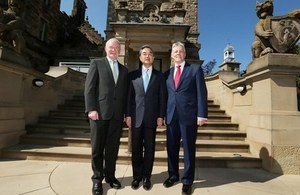
First Minister Peter Robinson, and deputy First Minister Martin McGuinness, today met with the Chinese Foreign Minister, Wang Yi at Stormont Castle ahead of the inauguration Ceremony of the Chinese Consulate in Belfast.
Picture by Kelvin Boyes / Press Eye.
Speaking after their meeting with Minister Wang Yi the First Minister Peter Robinson:
I am delighted to welcome Foreign Minister Wang Yi to Belfast. Over recent years Northern Ireland has developed a strong and increasingly positive relationship and bond with partners in China. This will be further enhanced with the establishment of the Consulate in Belfast.
In April 2012, Vice-Premier Madame Liu Yandong visited Belfast and launched the Confucius Institute which has flourished and developed remarkably. As a result, eight classroom hubs have been established and thousands of local children in over one hundred schools are learning the Mandarin language and about Chinese culture, as part of the Confucius programme. These relationships have brought considerable mutual benefit to students and teachers in both our regions.
We are hopeful that this will extend to agriculture, economic cooperation and increased trade. The potential for Northern Ireland companies to prosper in the Chinese marketplace is endless. Invest NI recognises this opportunity and has established offices in Beijing and Shanghai. Along with the Executive Bureau in Beijing, this represents a long term commitment by the Northern Ireland Executive to develop and grow our relationship with China.
The deputy First Minister Martin McGuinness said:
I welcome Foreign Minister Wang Yi and the new Consulate in Belfast. This is a very exciting development for all of us in the north of Ireland with the Chinese government demonstrating a firm commitment by establishing a Consulate here led by Madam Consul-General Wang.
We are keen to strengthen government to government relations and to further develop, trade, investment, cultural and education links with China. Agriculture Minister Michelle O’Neill, has just returned from a hugely positive visit to Beijing. The developments in the agricultural sector have been helped by the invaluable work of the Bureau with the Chinese Government in Beijing, the Consulate in Belfast and the Chinese Friendship Association.
Our relationship with China continues to grow and we look forward to working with China to help create jobs, promote prosperity and at the same time promote mutual understanding of our different cultures.Northern Ireland Ties with China
Good Relations Week
Good Relations Week 2021 takes place from will run from Monday 20th to Sunday 26th September 2021.
This year we have re-introduced physical events, alongside an expanded virtual offering.
The theme is ‘Brighter Days Ahead’ as we shine a light on the peace building and cultural diversity efforts of young people and the challenges they are facing.
Our programme of inspiring community relations events will celebrate the work of people and communities in creating and sustaining good relations.
Huge thanks to all local groups and organisations who’ve helped us put together a dynamic programme of highly impactful events for you to enjoy
Whatever you do, don’t miss it!

Pictured with Peter Day from the Community Relations Council (front, left) and Clare Kearney (front, right) and Conor Valente (front, centre) from the Belfast Skate Collective, a local group that is providing a voice for the skating community, is local skaters Nicole Smallwood; Adam Patton, Caleb Court, James Ferris, Taylor Allen, Reuben Hughes, James Hannigan, Jake Murray and Matt McCopippin.
It s a Walk in the Park
A new ‘Civic Dollars’ mobile phone app, developed with support from Belfast City Council and the Department of Justice means that people can now earn rewards for the time they spend in their local parks and open spaces.
The Connswater Community Greenway will be the first area to go live in the free pilot scheme, followed by other parks across the city. Funded through the ‘Amazing Spaces, Smart Places’ project, the scheme is part of the council’s Smart Belfast programme, which is exploring how data and innovative technologies can create smart solutions for urban challenges and help to improve city services.
Lord Mayor Councillor Kate Nicholl said: “Exercising outside and connecting with nature really can help our mental wellbeing. So it’s fantastic that, thanks to this pilot scheme, people can now earn Civic Dollars for the time they spend in our parks and open spaces. They can enjoy rewards including Translink DayLink passes and tickets to visitor attractions or support their local community group by donating Civic Dollars to them.
“The Civic Dollars app also provides a promotional platform for local businesses, services and events - and the insights we’ll gather will help us to better understand how people use green spaces, improve park management, reduce vandalism, littering and anti-social behaviour and enhance the visitor experience.”
A number of Belfast-based community groups can benefit from donated Civic Dollars, exchanging them for various services such as business training, professional advice and activity centre sessions.
The ‘Amazing Spaces, Smart Places’ project is jointly funded by Belfast City Council and the Department of Justice via the Department for the Economy’s Small Business Research Initiative (SBRI), which enables the public sector to tap into new ideas and technologies created by innovative local businesses. It also gives innovators a great opportunity to trial and test their prototype in a supportive real-world environment as part of their product development.
Justice Minister, Naomi Long said: “Effectively managing public open spaces is a key element in developing a safe community, where we respect the law and each other.
“The Civic Dollars pilot scheme holds the potential to deliver real benefits to local communities by using technology to improve the safe use of our parks and open spaces; something that is so important for both physical and mental health. Congratulations to all involved in this innovative pilot scheme and I look forward to hearing how it has progressed as more people use it in the coming weeks and months.”
Stephen McPeake, CEO of local company Moai Digital Ltd and creator of the Civic Dollars app, added:“It’s been fantastic to have this opportunity to apply a tech based solution to Belfast City Council’s challenge of better managing their parks and open spaces. And it’s wonderful to know that local people, businesses and community groups will all benefit as a result when people download and use the Civic Dollars app. Life these days is about so much more than just money – it’s about improving our communities, and our own health and wellbeing – Civic Dollars provides the perfect solution with a new social currency. It’s a win win all round!”
The CivicDollars app can be downloaded free from the App Store or Google Play Store. The pilot will run until the end of Summer 2021.
For more information about the project, visit www.belfastcity.gov.uk/amazingspaces
